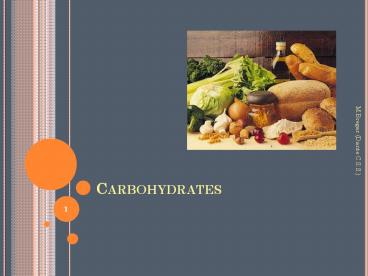Biology 11 - Carbohydrates - PowerPoint PPT Presentation
Title: Biology 11 - Carbohydrates
1
Carbohydrates
2
Carbohydrates
- Source of energy for living organisms
- Molecules containing carbon, hydrogen, oxygen in
a 121 ratio - Ex. Glucose is C6H12 O6
3
Carbohydrates Give Us Energy
4
Carbohydrates
- Three types of CHOs
- Monosaccharides
- Disaccharides
- Polysaccharides
SIMPLE CARBOHYDRATES
COMPLEX CARBOHYDRATES
5
Carbohydrates
6
Monosaccharides
- Only 1 sugar unit monomer
- Examples
- Glucose energy in cell
- Fructose fruit sugar sugar
7
Monosaccharides
- Glucose is found in sport drinks
- Fructose is found in fruit
- Glucose Fructose found in honey
- Galactose milk sugar
8
Monosaccharides
- Classified based on the number of carbon atoms
- TRIOSE 3 sugars
- TETROSES 4 sugars
- PENTOSE 5 sugars
- HEXOSE 6 sugars
- HEPTOSE 7 sugars
TRIOSE C3H6O3
9
PENTOSE C5H10O5
HEXOSE C6H12O6
10
Monosaccharides
- ISOMERS are compounds with the
- same chemical formula
- but
- different structure
11
Isomers
- Glucose Fructose are isomers because theyre
structures are different, but their chemical
formulas are the same
12
Examples of Isomers
VS
13
Examples of Isomers
VS
14
Examples of Isomers
VS
VS
15
Polysaccharides
- Made of 2 or more sugar units polymer
- Example
- Glucose Fructose Sucrose
- (mono) (mono) (disaccharide)
16
Examples of Polysaccharides
Glucose Monomer
Starch
Glycogen
Cellulose
17
Making Polysaccharides
- Dehydration Synthesis (condensation reaction)
- Removing water to make a larger molecule
- ie. Involved in making a disaccharide
18
Breaking Polysaccharides
- Hydrolysis
- The opposite reaction
- Water is used to break large molecule into
smaller one
19
Closer look at Hydrolysis / Condensation
20
Carbohydrates
- Polysaccharides
- A complex carbohydrate
- POLYMER Long chains of monosaccharides
21
Condensation Reactions(polysaccharides)
22
Important Polysaccharides
- STARCH
- A plant polysaccharide
- Energy storage molecule for plants
- Animals obtain energy from starch (potatoes,
grain, and rice) by breaking it into glucose
23
Important Polysaccharides
- GLYCOGEN
- An animal polysaccharide
- Excess sugar is stored temporarily in the form of
glycogen - Glycogen stores are found near muscle/liver cells
24
Important Polysaccharides
- CELLULOSE
- Most abundant organic molecule on Earth
- Makes up fibrils tough cables in cellular
walls of plants - No nutritional value for humans, but provides
roughage (dietary fiber)
25
Cellulose
SUGARS
26
Dietary Cellulose
Herbivores have bacteria in their digestive
tracts that can break down cellulose
27
Important Polysaccharides
- Chitin
- Modified form of cellulose
- Forms exterior skeleton of insects and
crustaceans (shrimp, lobsters, etc.)
28
Carbohydrates and Fats Work Together
29
Glucose Fuels the Body
- Large carbohydrates are broken down, before being
used - Small carbohydrates (glycogen) are stored for
immediate needs of the body.
30
Respiration Releases The Potential Energy in
Glucose

